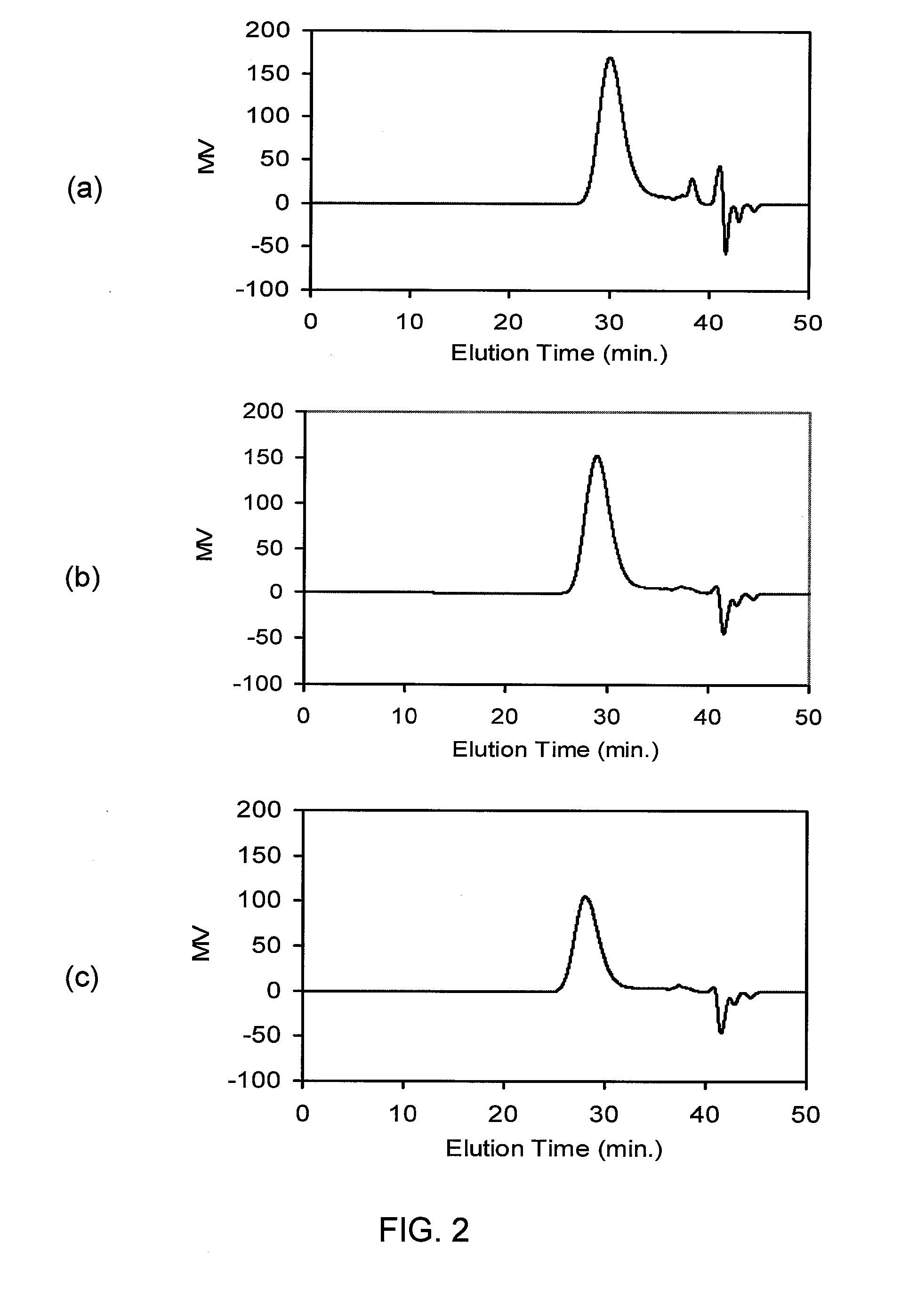Telechelic Olefin Metathesis Polymers from Renewable Feedstocks
a technology of telechelic olefin and polymer, which is applied in the field of olefin metathesis, can solve the problems of reducing the chemical resistance of the ultimate telecheli
- Summary
- Abstract
- Description
- Claims
- Application Information
AI Technical Summary
Benefits of technology
Problems solved by technology
Method used
Image
Examples
example 1
Synthesis of octadec-9-en-1,18-dioic acid dimethyl ester (9C18-DME) from soy fatty acid methyl ester (FAME)
[0136]A 50 gal reactor was charged with 222 lbs (101 kg) soy FAME, 2.50 kg Magnesol® XL (the Dallas Group of America Inc.), 1.50 kg bleaching powder and 1.53 kg Celite. The mixture was purged with a stream of Ar and stirred at 80° C. overnight. After 15 hours the mixture was cooled to room temperature while stirring under Ar, then after 22 hours this was filtered under vacuum through a 20 in. filter cartridge (0.5 μm pore Polyflow-C, PTI Advanced Filtration) to give a clear golden oil which was stored under Ar in the presence of 10 ppm BHT. Recovery of purified soy FAME was 201 lbs, 90.5%.
[0137]A 50 gal reactor was charged with 201 lbs (91 kg) purified soy FAME, degassed under vacuum and back-filled with Ar three times. C827 (19.44 g, 50 ppm per C═C assuming 1.5 C═C eq. per soy FAME) was added to the cooled soy FAME under Ar, rinsing the container with ca. 10 ml CH2Cl2. But-1-e...
example 2
Synthesis of 1,18-dihydroxyoctadec-9-ene (9C18-diol) from 9C18-DME
[0139]9C18-DME (11.3 g) was dissolved in anhydrous toluene (40 mL) and the mixture purged with Ar for 20 minutes, and then cooled to 0° C. using an ice / salt bath. An Ar-flushed addition funnel was charged with Vitride (˜70% solution in toluene, 26.3 g), which was then added to the cooled, stirred 9C18-DME solution over 1 hr. After addition was complete the mixture was allowed to warm to room temperature over 1 hr, after which an aliquot removed for 1H NMR analysis revealed that no 9C18-DME remained. A solution of 2-propanol in CH2Cl2 (˜50% by volume, 50 mL) was added slowly, followed by careful addition of distilled water (100 mL). The organic and aqueous fraction were separated, and the aqueous fraction was extracted with additional CH2Cl2 (50 mL). The organic fractions were combined, washed with distilled water (2×100 mL), dried over MgSO4, filtered, and the filtrate reduced in volume in vacuo. Cooling the filtrate ...
example 3
Synthesis of α,ω-diols from jojoba alcohols (mixture of octadec-9-en-1-ol, eicos-11-en-1-ol and docos-13-en-1-ol) for use as CTAs
[0140]A 5 L 3-neck RBF was equipped with an overhead mechanical stirrer, argon gas inlet and a gas inlet attached to a bubbler. The flask was charged with 1 L jojoba alcohols derived from the saponification of jojoba oil and 2 L hexanes. The solution was stirred vigorously and sparged with argon for 30 min. During that time, the flask was cooled in an ice bath (temp held between 2-10° C.). After cooling for 1 hr, a solution of C627 (533 mg, 250 ppm or 0.025 mol %) in 3 mL CH2Cl2 was added to the flask. The r×n was for 6 hrs while the ice bath was maintained at 2-10° C. After 6 hrs, the stirring was stopped and the solid allowed to settle overnight.
[0141]After settling 15 hrs, the liquid was removed by stick filtration and the solid washed with hexanes (2×μL). The solid was dried in vacuo overnight. Yield=274 g, white powdery solid identified as 16% hydroca...
PUM
| Property | Measurement | Unit |
|---|---|---|
| temperature | aaaaa | aaaaa |
| temperature | aaaaa | aaaaa |
| temperature | aaaaa | aaaaa |
Abstract
Description
Claims
Application Information
 Login to View More
Login to View More - R&D Engineer
- R&D Manager
- IP Professional
- Industry Leading Data Capabilities
- Powerful AI technology
- Patent DNA Extraction
Browse by: Latest US Patents, China's latest patents, Technical Efficacy Thesaurus, Application Domain, Technology Topic, Popular Technical Reports.
© 2024 PatSnap. All rights reserved.Legal|Privacy policy|Modern Slavery Act Transparency Statement|Sitemap|About US| Contact US: help@patsnap.com










